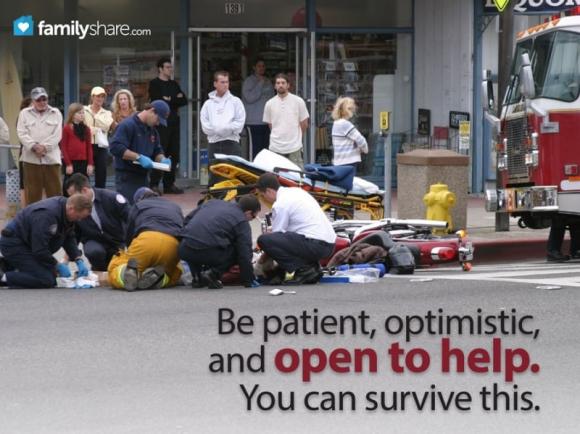
In 2005, my wife and I were involved in a motorcycle accident on the freeway that left me bruised and battered, but otherwise standing. My wife Gail, however, ended up in intensive care with more than 15 bones broken in about two-dozen places. Several surgeries were required to put her back together.
The accident happened on July 9; just days before Christmas she took her first unaided, tentative steps after the accident. Gail feebly returned to work in February. Her recovery - in some sense still ongoing more than seven years later - took about five years to peak. It is from this experience that I offer a few thoughts about recovering from a major injury. Of course many people have experienced worse; I don't wish to compete in a game of comparing qualifications by scale of tragedy.
Gail wasn't lucid during most of her 10 days in the hospital. Upon returning home, our lives were turned upside down. We had to rent a hospital bed, a commode that could be stationed next to the bed and a wheelchair.
Get help
We could not have survived those first six weeks without extensive volunteer help from family and friends. Gail required constant care and I had a business to run. We've never been so glad to have a big family and a loving faith community. Most people want to help but don't know how. In such a situation, don't be afraid or too proud to ask. You'll need the help.
Be optimistic
Gail was always much better than I at seeing a healthy future. This helped to get her through the excruciating physical therapy required after the surgery to reconstruct her knee. I'll never forget watching her cry as the therapist worked to stretch her leg, both silently cursing the doctor who had prescribed the therapy. Gail could always see herself returning to action.
Be patient
Progress was painfully slow. Literally. But there was progress. With broken bones on all four limbs, after about six weeks we began removing the casts and splints. While progress was difficult to measure each day, it was relatively easy to measure progress each week. New range of motion returned; more strength came. Be patient with yourself or with a family member after an injury.
Do the work
Recovery from an injury will ultimately require physical training. Gail required therapy in order to learn everything from how to hold a pencil to walking again. The therapy was frustrating and painful at times, but she kept it up. Progress is often a result of the effort.
Guard your relationships
A major injury causes pain that will, among other things, impact your mood. If you are unable to care for yourself, you'll have no alternative but to ask for help - constantly. This new dynamic in a relationship with a spouse, parent or child will test that relationship. Caregivers must lovingly serve, but also need to seek relief; get help so you can take a break. Patients need to be patient, too. Talk openly - and kindly - about how to meet one another's needs to preserve your relationship.
By following these five principles you can survive and overcome a major injury and all of the stress that it will put on your family.

